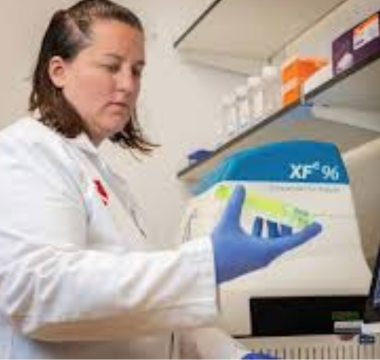My PD Story

Kelly Stauch, PhD
2025 Impact Award
Building a Toolkit to Study Early-Onset Parkinson’s Genes in Rat Models
Genetic variants of the genes PRKN and PINK1 are the most common causes of young-onset Parkinson’s disease (PD). These two genes help create proteins, Parkin and Pink1, that maintain healthy mitochondria, the powerhouses of cells. PD-associated variants of these genes lead to impaired mitochondria maintenance and recycling, contributing to the progressive loss of dopamine-producing neurons in the brain.
Research into PRKN- and PINK1-associated PD has been difficult since mice—the most common animal model for research—with loss of function genetic variants do not exhibit PD-like disease symptoms. This has made it challenging to evaluate therapeutic treatments for PD cases resulting from genetic variants of these genes.
Kelly Stauch, PhD, recipient of a Parkinson’s Foundation Impact Award, is building out tools so that researchers can better use rats to study mitochondria health in PD. Unlike mice, rats with loss of function PRKN and PINK1 variants develop PD-like neurodegeneration and symptoms, making them more effective animal models for studying these genes.
“The tools developed as part of this award will aid my PD research as well as others in the field by providing a method to study cell type-specific mitochondria in non-mice models of PD." – Dr. Stauch

Working out of the University of Nebraska Medical Center in Omaha, Dr. Stauch will utilize a molecular tag that lets her microscopically visualize mitochondria in rat neurons. Co-created with her collaborator Ian Ganley, PhD, this mitochondria tag will establish new data on how Parkin and Pink1 proteins influence mitochondria health and recycling.
Dr. Stauch will then use a similar mitochondria tag to measure how Parkin and Pink1 disruption affects the function of mitochondria and their recycling in cells. Mitochondria naturally wear out over time, so the ability to disassemble them and make new mitochondria is essential for cell health. Using these tagging tools and looking at PD-related dopamine neurons in rat brains, Dr. Stauch will expand our biological understanding of Pink1 and Parkin-related PD, contributing to future research and treatment development.
“This award will allow me to complete this innovative project, which will enable a new approach for studying mitochondria in nigrostriatal dopaminergic neurons in rat models of PD,” said Dr. Stauch. “Further, the tools developed here could be used in other PD rat models as well as adapted to other non-rodent models in the future.”
Meet more Parkinson’s researchers! Explore our My PD Stories featuring PD researchers.
Related Materials
More Stories
from the Parkinson's community


